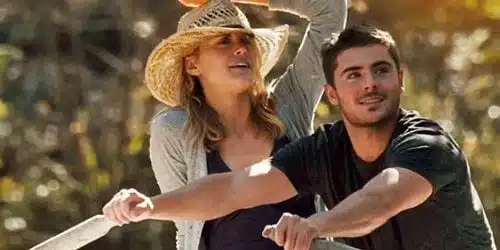
The Lucky One opens with a sweeping, sky-view of swamplands—cueing the audience to view the proceedings as a kind of travelogue. Set in Louisiana, and briefly, Iraq, The Lucky One treats its setting as a piece of melodrama in and of itself. The characters may strut, fret, shower and hump, but it’s the bayou that steals the show. Taylor Schilling (as Beth, one of the many titular “lucky ones”) may prance about in short shorts, but she competes with the sultry dangle of the weeping willows and the spectacular flirtation of the real estate and the roses. The visual design totally outshines Romantic Country, Southern Living and any of the rest of those lifestyle mags that offer close-ups of pie crusts and dining tables set with “shabby” china in the midst of an impeccably overgrown garden.
The film’s luxuriant depiction of nature and the wonder of domestic life both buoy and mask its conservative agenda, a recuperative history of the Iraq war. It’s hard to get critical or analytic when visuals of soapsuds work to seduce you. Why question ideology when you can watch a rental unit go from ramshackle to glorious in one of many montages set to pop country tunes and featuring decorating tips and biceps.
The story concerns a marine, Logan, (played by Zac Efron’s eyes) who spies a rectangular flicker of light amidst Iraqi rubble after a gunfight. He walks toward the mysterious object and discovers a photo of blonde Beth (the girl with the legs). After bombs explode, harming every marine nearby but him, he decides to find the girl in the photo. Lucky for him, a Google search helps him find her location in seconds. Then he walks, during the opening credits, from Colorado (his post-deployment pit stop) to Louisiana, and by the end of the sequence he’s at her doorstep.
Next, they fall in love and everything’s mint juleps and peaches. Not So Fast! First, there’s an ex-husband baddie (played by Jay R. Ferguson or Stan Rizzo on Mad Men), who uses Beth’s son (Riley Thomas Stewart) as an emotional pawn, threatening to take him away if Beth won’t stop kissing the marine drifter. Then some other factors get in the way. The main one being Beth’s severe inner conflict over whether or not to succumb to Logan’s sexual intensity. There’s also the mystery over how Beth’s photo ended up in the dust of Iraq.
Logan narrates that opening shot of the bayou. He tells us, “Sometimes finding the light means you have to pass through the deepest darkness.” And we cut to Iraq. Indeed, the Iraq sequence has a contrary visual design to the lushness that depicts American soil. In the opening firefight, at times the scene is completely dark. When Logan fires, his gunshot emits bursts of light, but the only visual to emerge out of that darkness is the crisp blue of Efron’s eyes, so deeply cerulean they seem digitized. Another distraction. And a persuasively conservative mode for Iraq war representation.
The film’s theme, additional to its basic premise that hard work, jambalaya, outdoor showers and other American notions are darn good, is that no one died “for nothing” in Iraq.
This idea, if it were true, might actually ease some of the anguish, pain, PTSD and assorted unimaginable horrors of anyone involved with the Iraq war (on either side) and in whatever role. However, this particularly American quandary, the rationalizing of what the dead of the Iraq war died for, must postulate an unbearable answer. Post-mandatory patriotism, post-Bush II, post-fake WMDs, the answer just might be… for nothing.
In that case, The Lucky One, which was unanimously panned by critics, but adored by fans to the tune of a $91 million worldwide gross, provides insight into a peculiar form of American war rationalization. The love affair, and ultra-hot chemistry between Schilling and Efron, is a stand-in for the real romance—the one between the audience and an irresistible version of America.
Blythe Danner (as Beth’s sage-wise grandma) provides gravitas. Her performance, effortless compared to the stiffness of Schilling and Efron, has a way of grounding the events. Like the gorgeous cinematography that makes marshlands drip with sunlight, the film makes implausibility seem real, as if the stuff we look at is true. Love is magical, no one died for nothin’ in Iraq, and the South in particular is the land of the lucky.
The special features include three short documentaries, one on Nicholas Sparks (who wrote the novel) and his general delight with this current adaptation. The next concerns the “chemistry” between Schilling and Ephron, which is celebrated and confirmed. The third, and most interesting, is a six-minute doc, “Zac Ephron Becomes a Marine”, which details Zac’s research for the role, talking to real marines, several of whom carry lucky charms. At the end, a succession of marines state their names, rank and hometowns. The last one gives a shout out to the guys in Afghanistan.
You could watch the Republican National Convention, or you could see The Lucky One on blu-ray and get a different angle on the ways that voters are wooed. I recommend the latter.

